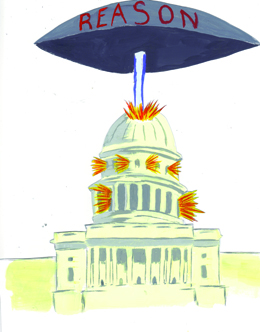Abolish the Senate
Just put it down.
By Kevin Eggleston

The United States Senate, esteemed deliberative body, world’s most exclusive club, and nicest nursing home in America, is no longer necessary. While it was certainly kind of them to deliberate on our behalf — some of us more than others — for more than 200 years, their time of utility has come to an end.
Not to say the Senate a bad job, but its time has simply passed (although the multiple failures attempting to pass anti-lynching legislation or that infamous middle-finger to Wilson’s League of Nations just may disqualify them from the Medal of Freedom). Current filibuster rules don’t even require anyone to stand up and talk — they need only threaten, in order to stall the legislation of the day.
We the people no longer need the input of the Upper House on our legislative matters. We already know what will happen: squabble, dither, dather, offend, stall, sell-out, run for president. Let’s just not have a Senate and say we did, for constitutionality’s sake, if that still matters at all these days.
The recently passed healthcare reform may temporarily instill a sense of purpose and pride in the old bunch. But healthcare reform is really only a case in point. America first began debating ways to fix its healthcare system under Roosevelt. No, not FDR — Republican Teddy Roosevelt thought that a system to expand medical coverage for more Americans was probably a good idea over 100 years ago. Truman, Johnson, Nixon, and Clinton each attempted to reform the system so less people would die. The Senate, like the inane, satire-of-contemporary-bureaucracy “computer” in Little Britain, said no. Senate says no. Senate says no. Senate says no.

Part of the reason for this nay-saying is the Senate filibuster rules, which — for reasons too labyrinthine to flesh out in this article — require a supermajority of 60 senators to pass anything of substance. The fuzzy math in the Senate universe states that a majority is not simply “more than half,” but more than three-fifths. These days, one senator can place an “anonymous” hold on a bill (effectively holding the legislation hostage) and demand goodies for their state in order to secure its release. This gobbledygook isn’t in the constitution either; it’s something the Senate decided would be cool based on a suggestion by Aaron Burr, who later shot Alexander Hamilton, also known as our hottest founding father, because he also thought duels were a good idea.
As the gods of irony orchestrated, Alexander Hamilton was also the U.S. daddy with enough foresight to caution against our present situation. In Federalist Paper 75, he warned against the idea of a supermajority: “The history of every political establishment in which this principle has prevailed is a history of impotence, perplexity and disorder.” Sounds like how the Senate functions now, except for the impotence part— as Senators John Edwards, Larry Craig, John Ensign, and others can attest.
Even, worse, the Senate simply scoffs at the “one man, one vote” principal of equal representation of our citizens in government. Back in the day, when our frumpy forefathers were figuring out how to get all the bratty colonies to play nicely, they threw a bone to New Jersey with the Great Compromise. This granted which America a bicameral legislature, one of which was based on population, and one where New York received the same number of seats as Delaware. This was the Senate. (That’s probably why Delaware approved the constitution first − good fricken deal.)
This means if a small state produces a senator of particularly strong health and re-electability, and can rise to power in the seniority-based structure of the Senate, then a relatively small group of citizens might have quite a bit of power over their fellow Americans. Think the residents of West Virginia, their love of coal, their old Senator Rockefeller and ancient Senator Robert Byrd (third-in-line to the presidency), and the Senate’s general inability to do anything in regards to climate change. Believe me, these things are connected.
Some may ask, why can’t we destroy the Senate little by little, say by reforming the filibuster rule, or halting the election of new senators and letting the old ones die. These are interesting ideas, but I would counter that there is no time like the present. As Julius Ceasar, a man who worked very, very closely with a Senate that got shit passed put it like this: “Experience is the teacher of all things.” And experience taught us to send the old folks home.
illustration by Walker Kampf-Lassin
